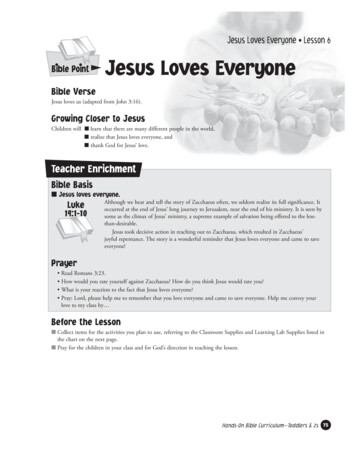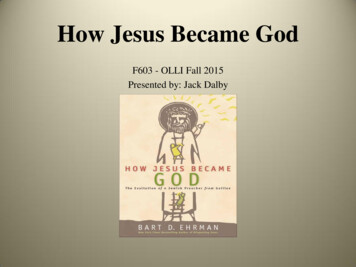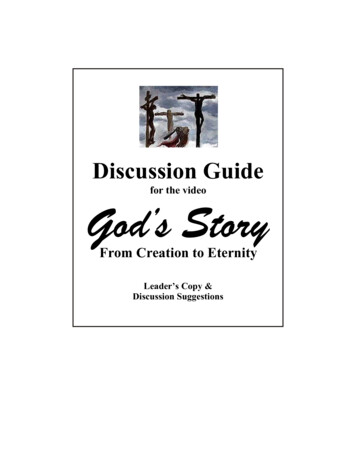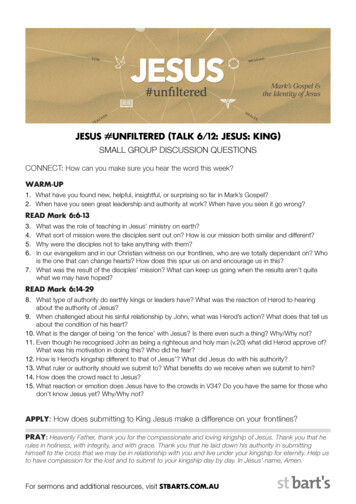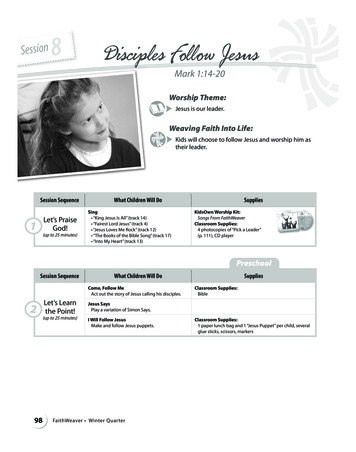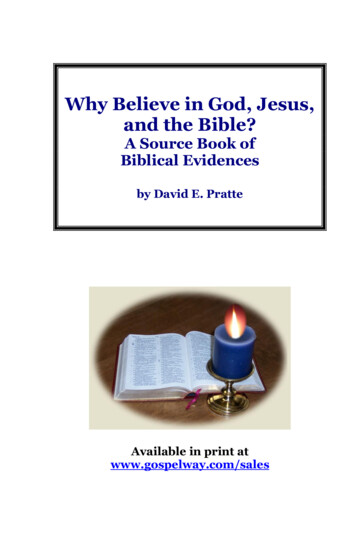
Transcription
Why Believe in God, Jesus,and the Bible?A Source Book ofBiblical Evidencesby David E. PratteAvailable in print atwww.gospelway.com/sales
Why Believe in God, Jesus, and the Bible?A Source Book of Biblical Evidences Copyright David E. Pratte, 2006, 2013All rights reservedISBN-13: 978-1493585236ISBN-10: 1493585231Note carefully: No teaching in any of our materials isintended or should ever be construed to justify or to in anyway incite or encourage personal vengeance or physicalviolence against any person.“He who glories, let him glory in the Lord”– 1 Corinthians 1:31Other AcknowledgementsUnless otherwise indicated, Scripture quotations are generally from theNew King James Version (NKJV), copyright 1982, 1988 by Thomas Nelson,Inc. used by permission. All rights reserved.Scripture quotations marked (NASB) are from Holy Bible, NewAmerican Standard La Habra, CA: The Lockman Foundation, 1995.Scripture quotations marked (ESV) are from The Holy Bible, EnglishStandard Version, copyright 2001 by Crossway Bibles, a publishingministry of Good News Publishers. Used by permission. All rights reserved.Scripture quotations marked (MLV) are from Modern Literal Versionof The New Testament, Copyright 1999 by G. Allen Walker.Scripture quotations marked (RSV) are from the Revised StandardVersion of the Bible, copyright 1952 by the Division of Christian Education,National Council of the Churches of Christ in the United States of America.Scripture quotations marked (NIV) are from the New InternationalVersion of the Holy Bible, copyright 1978 by Zondervan Bible publishers,Grand Rapids, Michigan.Why Believe?Page #2
Other Books by the AuthorTopical Bible StudiesGrowing a Godly Marriage & Raising Godly ChildrenWhy Believe in God, Jesus, and the Bible? (evidences)The God of the Bible (study of the Father, Son, and Holy Spirit)Grace, Faith, and Obedience: The Gospel or Calvinism?Kingdom of Christ: Future Millennium or Present Spiritual Reign?Do Not Sin Against the Child: Abortion, Unborn Life, & the BibleTrue Words of God: Bible Inspiration and PreservationCommentaries on Bible BooksGenesisJoshua and RuthJudges1 SamuelEzra, Nehemiah, and EstherJobProverbsGospel of MarkGospel of JohnActsRomansEphesiansPhilippians and ColossiansHebrews1 & 2 PeterBible Question Class BooksGenesisJoshua and RuthJudges1 SamuelEzra, Nehemiah, and EstherJobProverbsEcclesiastesIsaiahGospel of MatthewGospel of MarkGospel of LukeGospel of JohnActsRomans1 Corinthians2 Corinthians and GalatiansEphesians and PhilippiansColossians, 1&2 Thessalonians1 & 2 Timothy, Titus, PhilemonHebrewsGeneral Epistles (James – Jude)RevelationWorkbooks with Study NotesJesus Is Lord: Workbook on the Fundamentals of the Gospel of ChristFollowing Jesus: Workbook on DiscipleshipGod’s Eternal Purpose in Christ: Workbook on the Theme of the BibleVisit our website at www.gospelway.com/sales to see acurrent list of books in print.Page #3Why Believe?
Other Resources from the AuthorPrinted books, booklets, and tracts available atwww.gospelway.com/salesFree Bible study articles online atwww.gospelway.comFree Bible courses online atwww.biblestudylessons.comFree class books atwww.biblestudylessons.com/classbooksFree commentaries on Bible books atwww.gospelway.com/commentaryContact the author atwww.gospelway.com/commentsWhy Believe?Page #4
Table of ContentsIntroduction .6Testimony #1: Creation . 34Testimony #2: John the Baptist. 58Testimony #3: The Father and the Son .65Testimony #4: Fulfilled Prophecy . 76Testimony #5: Miracles . 100Testimony #6: The Resurrection of Jesus . 119(Due to printer reformatting, the above numbers may be off a page or two.)Notes to the ReaderThis material is a highly condensed study ofevidence to serve as helpful resource material for study,teaching, or preaching intended to establish andstrengthen faith in God, Jesus, and the Bible.Unless otherwise indicated, Bible quotations are from theNew King James Version. Often - especially when I do not usequotations marks – I am not quoting any translation but simplyparaphrasing the passage in my own words.To join our mailing list to be informed of new books orspecial sales, contact the author atwww.gospelway.com/commentsPage #5Why Believe?
IntroductionThe purpose of this study is to examine the evidence for themajor claims of the Bible. We will focus our attention especiallyon the evidence provided in the Bible itself.The Bible Makes Three Fundamental Claims.1. The Bible claims that the God of the Bible exists and isthe one true God.Genesis 1:1 - In the beginning God created the heavens andthe earth.Hebrews 11:6 – We must believe that God exists.Deuteronomy 4:35,39; 6:4 – The God who claims to speakthrough the Bible is the one and only true God.[See also Isaiah 43:10-13; 44:6-8,24; 45:5,6,14,18,21-23;52:6; Matthew 4:10; 2 Samuel 7:22; 1 Chronicles 17:20; Exodus20:3-6; 34:14; Deuteronomy 6:13-15; 32:39; Psalm 86:10; Zech.14:9; Mark 12:29; 1 Corinthians 8:4-6; James 2:19; 1 Timothy 2:5]2. The Bible claims to be an inspired revelation of God’swill.2 Timothy 3:16,17 – The Scriptures are inspired by God toprovide us with instruction in righteousness and every good work.1 Corinthians 14:37 – Paul claimed that the things he wroteare commandments of the Lord.[See also 1 Corinthians 2:10-13; Ephesians 3:3-5; John 16:13;Matthew 10:19,20; Galatians 1:8-12; 2 Peter 1:20,21; 1Thessalonians 2:13; Luke 10:16.]3. The Bible claims that Jesus is God’s Son.John 20:26-31 – Jesus allowed Thomas to call him “my Lordand my God.” To have eternal life, we must believe that He is theChrist, the Son of God.Why Believe?Page #6
John 4:42 – The Samaritans claimed Jesus was indeed theChrist, the Savior of the world.Each person is responsible to consider whether or not theseclaims are true. This requires giving careful consideration to theevidence, such as is presented in this study. Our eternal destinyhangs in the balance.If we conclude the claims are true, we are then responsible tolearn to present the evidence to others – 1 Peter 3:15; Philippians1:7,17.It follows that all people, believers and unbelievers, need tocarefully study the evidence for the claims of the Bible.[See also John 1:1-3,14; 8:24; Luke 19:10; Matthew 16:15-18;10:37; Colossians 2:9; Hebrews 1:2,8,9; Philippians 2:5-8.]There Can Be No Middle Ground Regarding These Claims.The nature of these claims is such that we cannot take amiddle-ground position. We cannot say, “The Bible is just a goodbook but not the inspired, infallible word of God,” or “Jesus wasjust a great man but not divine.” The Bible claims to be God’s ownword, and Jesus claimed to be God in the flesh. If these claims arenot true, then Jesus is a liar and the Bible is a fraud!Bible writers often warned against those who falselyclaimed to speak for God and those who followedmyths and fables instead of Divine truth.Jeremiah 14:14 - If a man presents a man-made idea butfalsely claims it is a message from God, that man is a false prophetand deserves to be punished and rejected as a prophet (23:16,26;Ezekiel 13:2-7,17).Ezekiel 3:26,27 - A prophet was not to speak until God openedhis mouth. When God did move him to speak it would be a thussays the Lord God.Matthew 10:19,20 – Jesus claimed that, when His apostlesspoke, it would not be them who spoke but the spirit of the Fatherspeaking in them.1 Corinthians 2:4,5 – Paul’s preaching was not with words ofhuman wisdom, so the faith of those who read the message shouldnot stand in the wisdom of men but in the power of God.1 Thessalonians 2:13 - The message is not the word of men butthe word of God.Galatians 1:8-12 - The gospel did not come from man, but wasrevealed from Jesus. To preach another gospel is to be accursed.Page #7Why Believe?
So, to preach a message that is human in origin is to bring God’scurse upon us.Revelation 22:18,19 - If men add their teachings to the book,God will add to them the plagues written. The Bible writersclaimed, not just that their message contained truth from God, butthat it was entirely from God. They were forbidden to addanything human to it.1 Timothy 4:7 — We must reject “old wives’ fables” andinstead follow after godliness. [1:4]2 Timothy 4:4 — Paul warned about some who would notwant sound doctrine, but would turn their ears away from thetruth and be turned aside to fables.2 Peter 1:16,20,21 — Specifically, Peter claimed that theapostles did not follow cunningly devised fables when they madeknown the power and coming of Jesus Christ. Prophecy nevercame by will of man, but holy men spoke as moved by the HolySpirit.So, the Bible writers claimed that they did not write fables,legends, or human doctrines. If Bible writers or if Jesus Himselfclaimed to speak for God when it was not true, then they wouldstand condemned by their own teaching. They could not possiblybe good men or great teachers, nor could the Bible be a good book.If their claims of inspiration are not true, then they should all beentirely rejected as frauds and false pretenders.[2 Cor. 11:13-15; 1 Tim. 4:1-3; Acts 20:28-30; 1 John 4:1; Titus1:9-14; 2 John 9-11; Romans 16:17,18; 2 Peter chap. 2]Bible writers and prophets severely rebuked those whomade or accepted untrue claims of religiousexaltation.Matthew 23:5-11 – Jesus severely rebuked religious leaderswho seek to be exalted religiously beyond their proper position.Acts 10:25,26 — Cornelius fell down to worship Peter. Peterforbade it saying that he himself was just a man. [Rev. 22:8,9;19:10; Rom. 1:25]Acts 12:20-23 – Herod allowed people to call Him a god, nota man. He did not make the claim himself, but was slain for simplyallowing others to make it on his behalf.Acts 14:11-18 – When Paul and Barnabas healed a lame man,the idol worshipers called them gods and wanted to offer sacrificeto them. They refused to accept such claims, saying that they weremen and not gods.Why Believe?Page #8
When applied to such teachings of those of Mohammed in theKoran or Joseph Smith in the Book of Mormon, for example, theabove principles would show that we must either accept thesebooks as being inspired by God or else reject them entirely asbeing fakes and frauds. We cannot take a middle-ground position.But the same is true of the claims of Jesus and the Bible. IfJesus or Bible writers made untrue claims, or even if theyknowingly permitted others to make untrue claims regarding theirwork, they would stand condemned. There is no middle ground.Either the Bible claims are true, or else we must totally reject Jesusand the Bible as being false and unworthy of our trust.The Relationship among the ClaimsIt is possible to believe in a god(s) without believing in theBible or in Jesus as the Son of God. However, note how the claimsof the Bible and of Jesus mutually support the other claims.The Bible supports the claim that God exists and Jesusis the Son of God.We have already cited passages where the Bible makes theseclaims. So, if the Bible is the inspired word of God, then the claimsit makes must be true. Therefore, any evidence that demonstratesthe Bible to be the word of God simultaneously validates theBible’s claims that God exists and that the God of the Bible is thetrue God and that Jesus is the Divine Son of God.Jesus supports the claims of both the Old Testament andthe New Testament writers to be inspired of God.Jesus demonstrated the existence and nature of God.John 1:14,18 – Jesus was the only begotten of the Father, theeternal Creator who possesses the full nature of Deity, yet came toearth in the flesh (vv 1-3). Although we cannot see God, the onlybegotten Son has declared Him.John 14:6-9 – He who has seen Jesus has seen the Father.Jesus’ teaching and character reveal and exemplify the characterof God.This means that men have personally seen one who was Godin the flesh and who revealed the nature of God. The life andteaching of this One can be investigated by the same means usedto investigate the lives and teachings of any other men of history.Page #9Why Believe?
Jesus quoted Old Testament Scripture asauthoritative revelation from God.Matthew 15:1-6 — He quoted Old Testament Scripture (v4) asbeing what God said (v4), the command of God (v3), the Word ofGod (v6).Matthew 22:31,32 — He quoted Moses’ writing as an accuraterecord of what “God said.”John 10:35 — “The Scripture cannot be broken.”Matthew 4:4,7,10; 22:23-33; Luke 10:25-28 - Jesus obeyedOld Testament law, taught others to obey it, and rebuked thosewho did not understand or obey it.[Matt. 8:1ff; 21:42-45; 15:7-9; 22:41-45; 24:15; 21:13; 13:1315; Mark 7:6; 12:10; Luke 4:16-21; 2:23; 16:29-31; 4:17ff;24:27,44-46; John 6:44,45; 8:17ff; 5:39,45-47; 1:45; Matt.26:54,56; Luke 3:4; 7:27; 18:31; 21:22; 22:37; John 2:22; 7:38;13:18; 17:12; 19:24,28,36,37; 20:9; Matt. 2:5; 11:10; 26:24,31;Mark 1:2; 9:1-14; Matt. 5:17; John 12:14,16; 15:25]Jesus also confirmed that the apostles and prophets,who wrote the New Testament, spoke authoritativerevelation from God.John 16:13 — Jesus promised the apostles that the Spiritwould guide them into all truth. [John 14:26]Matthew 10:19,20 — The Holy Spirit would give them whatand how to speak.Luke 10:16 — He who hears the apostles hears Jesus; he whorejects them rejects Jesus and rejects God Who sent Jesus.Jesus was a real individual who lived and walked on earth. Hisclaims can be investigated. If we accept Jesus as being a truespokesman for God, then we must also accept the existence of Godand the Bible as the inspired word of God. The claims of the Bibleand Jesus stand or fall together. We cannot accept either one andreject the other.The Importance of the Evidence Found in the ScripturesGod the Father is invisible (1 John 4:12). We cannot performlaboratory experiments to determine if He exists. Likewise,neither Jesus nor the men who personally wrote the Bible are aliveon earth today. But this does not mean we must accept a “blindfaith” without evidence.Why Believe?Page #10
The Bible claims that it itself provides sufficientgrounds to produce faith.Romans 10:17 — So then faith comes by hearing, and hearingby the word of God.2 Timothy 3:16,17 – Scripture itself is sufficient to provide usto every good work. If believing is a good work, then the Bibleshould be adequate to provide what we need.Acts 9:22; 17:2,3 – The men who wrote the Bible claimed thattheir teaching proves Jesus to be the Christ. [Acts 15:7]John 20:30,31 – Bible writers recorded the evidencesufficient to convince us to believe that Jesus is the Christ, so wecan have life in His name.John 17:20 – People believe on Jesus through the word of theapostles.Note John 7:17; 1 Peter 3:15.Many authors have offered evidences from outside the Bibleitself (“external evidences”) to demonstrate the validity of theBible’s claims. External evidences may have some value inconfirming and supporting the evidence found in the Bible itself.We will include some of it. But if the Bible is true, it should itselfprovide us with sufficient evidence to believe. This study will focusprimarily on evidence presented in the Bible itself. As we proceed,note how often Bible writers claimed to be giving such evidence.The value of historical and logical evidenceIn our daily lives, all of us determine fundamental beliefs onthe basis of historical and logical evidence. This is the principle ofbelief (faith) based on evidence. Consider some examples:* A hunter may not see an animal, but from its footprints, heknows it exists and can tell much about its nature. In the sameway, God has left His “footprints on the sands of time.”* How many people are convinced beyond reasonable doubtwho their parents are? On what basis do they believe this? Do theyremember personally seeing their parents at their birth? No, theybelieve because of the testimony of witnesses. Their parents andmany other people tell them who their parents are. Perhaps theyhave a birth certificate that identifies their parents. But this issimply the written testimony of witnesses.You accept who your parents are on the basis of faith.Without remembering the event personally, you believe on thebasis of the testimony of witnesses. Likewise, the Bible claims toPage #11Why Believe?
give you written testimony regarding who is your spiritualFather!* The testimony of witnesses is also used in our courtrooms.A judge and jury do not physically observe a crime. Yet they reacha verdict about what did or did not happen on the basis of thetestimony of witnesses. This verdict determines whether or not adefendant will be punished for his crimes. Likewise, the Biblegives eyewitness testimony, and your faith (or lack of faith) in thattestimony will determine your eternal destiny.* Historians also use this principle in writing records ofhistory. They study the statements of witnesses, especiallyprimary evidence from eyewitnesses – i.e., first-hand accountsfrom people who were personally present. Also of great value arerecords left by people who personally heard the testimony ofeyewitnesses.* The Bible claims that this is the kind of evidence it gives thatits basic claims are valid.Deuteronomy 19:15 – The guilt or innocence of one accusedof a crime was determined on the testimony of two or morewitnesses. See also Matthew 18:16; 2 Corinthians 13:1; 1 Timothy5:19; Hebrews 10:28.John 8:17 – Jesus recognized this principle and used it asevidence for His claims.The Bible claims that Jesus was God in the flesh. He wasDivine from eternity, but He came to earth to live as a man. If thisclaim is true, then God has been seen! He has walked among men,who saw Him, touched Him, and heard Him. Many who saw himhave left in the Bible their eyewitness testimony of what He didand said. His life, including His miracles and resurrection, can beinvestigated like any other historical events. Likewise, the claimsof miracles and prophecies by Bible writers can be investigated bylogical and historical evidence.We will see that this is the approach the Bible uses to convinceus to believe its claims. It presents evidence that, if examinedhonestly, will convince us that its claims are true.Some claim that the Bible cannot be permitted asevidence for itself.But since when is the one who is on trial not allowed topresent his case? Simple justice requires us to consider theevidence offered by one who seeks to prove his claim.Why Believe?Page #12
If a book claimed to be written by George Washington, whowould argue that we must determine the validity of the claimwithout examining the book itself? On the contrary, examinationof the book would be of first priority. We would seek to determinewhether or not it contained the kind of information that would beexpected to come from the supposed author.Suppose, after a man’s parents die, he finds a writtendocument claiming to be their last will and testament. How wouldthe man determine whether or not the will is genuine? Who wouldclaim that such a determination must be made without everexamining the will itself, and that any evidence presented fromwithin the will should automatically be rejected? What nonsense!There might be external evidence from outside the will that helpsdetermine its authenticity, but we would expect the primaryevidence to be found within the will itself. We would expect to findwithin it the testimony of the man’s parents and of witnesses thatit was genuine.Likewise, if the Bible really is a written statement of the willof God, we should expect to find within it the evidence of itsauthenticity. We should expect the contents of the book itself to beour primary source of evidence.If all the Bible did was make claims without offering evidence,we should not accept those claims as true. But the Bible doesmore: it provides evidence for its claims. To refuse to consider theevidence the Bible offers for its claims would be a total disregardof common sense and logic.So God “did not leave Himself without witness” (Acts 14:17).We will consider the evidence of the witnesses, just as is done byhistorians, by judges and juries, and by everyone in makingcommon sense decisions about matters we have not personallyseen.The Qualifications of Bible Writersas Witnesses and HistoriansWe will see that many Bible writers repeatedly claimed theywere giving testimony intended to convince people to believe theclaims of the Bible. However, the Bible often acknowledges thatwitnesses may give false testimony (Exodus 20:16). So how can wehave confidence that the testimony of the Bible writers is valid?Several criteria should be considered when evaluating thestrength and persuasiveness of witnesses. Consider how theseapply to Bible writers.Page #13Why Believe?
The number of witnessesAs already discussed, the Bible writers plainly acknowledgedthe need for a plurality of witnesses to establish the validity of anyhistorical event. See Deuteronomy 19:15; John 8:17 [Matthew18:16; 2 Corinthians 13:1; 1 Timothy 5:19; Hebrews 10:28]. Sinceanyone can make unsubstantiated claims, one witness alonecannot conclusively prove a fact. A plurality of witnesses is moreconvincing. And as the number of witnesses increases, the moreconvincing the evidence becomes (until we reach a saturationpoint).The Bible consists of 66 books written by 40 different menover a period of 1500 years. These men were of widely differentbackgrounds, separated by time and distance. There were kings,slaves, fisherman, physicians, etc. They lived in Palestine, inBabylon, and in Rome, from 1400 B.C. to 100 A.D.Nearly all of these writers, at some point in their writings,provide evidence that helps confirm the Bible claims. We willconsider evidence from many of these writers (though not all ofthem). As we study various line of evidence, please observe thenumber of different witnesses who offer testimony. We will makenote of the numbers of witnesses from time to time.The number of confirming eventsThe strength of the evidence depends, not just on the numberof witnesses, but also on the number of confirming events. Forexample, if one person claims a man robbed a bank, the evidenceis relative weak. But the evidence is much more conclusive ifdozens of witnesses claim to have seen the same man rob bankson numerous occasions in different places.So the Bible claims to give many evidences for its claims.John 20:30,31 – Jesus did so many signs that not all wererecorded. But enough have been recorded to convince the honestperson to believe.John 21:24,25 – John wrote his testimony and affirmed it tobe true. But Jesus did so many other things that the world couldnot contain the books that could be written.Acts 1:3 – The Bible provides “many infallible proofs.”Our study of these proofs will include six different major linesof evidence with many specific examples in each category. Thiswill include many evidences for creation, many examples offulfilled prophecy, many examples of miracles done by Jesus andWhy Believe?Page #14
other inspired men, and many events in which Jesus appeared topeople to prove He was alive again after His death.Ability and opportunity of the witnesses to observewhat they reportThe more distant the witnesses are from the events theyrecord, the less convincing their evidence becomes. There is littlevalue in hearsay evidence passed from person to person, or inlegendary claims recorded generations after the alleged eventsoccurred. Most convincing is first-hand eyewitness testimony, inwhich people testify about events they personally saw andexperienced. Nearly as important are historical statementsrecorded by people who personally interviewed the first-handeyewitnesses.Notice just a few of the many passages showing that Biblewriters were first-hand eyewitnesses of the events they wroteabout or else they carefully recorded accounts they heard or readfrom those who were eyewitnesses.* Statements from LukeLuke 1:1-4 — Luke wrote a history of the life of Christ and ahistory of the early church in the book of Acts (cf. Acts 1:1-3). Hedid not claim to be a personal eyewitness of Jesus’ life, but heserved as an historian to record events that were witnessed by theapostles and others. He himself was, however, an eyewitness ofmany events in the early church (note his use of “we”).Note that Luke did not write legends handed down forgenerations. Rather, he wrote what had been told him byeyewitnesses, so we could know that these things are “certain”(v4), not myth or fable. As an historian, his reputation is wellestablished.* Statements about the apostlesThe apostles followed Jesus personally, traveling all overPalestine with Him for a period of over three years. Theypersonally observed His miracles and saw Him alive again afterHis death. They repeatedly claimed that their statements werebased on personal eyewitness testimony, and that in fact Godchose them specifically for that purpose.Acts 1:1-3 – Jesus presented Himself to His apostles, so theysaw and spoke with Him for a period of forty days following Hisdeath. In this way He demonstrated Himself to be raised from thedead by “many infallible proofs.”Page #15Why Believe?
Acts 1:8 — Jesus told the apostles they would be His witnessesthroughout the earth.Acts 1:21,22 — To be an apostle one had to be an eyewitnessof Jesus’ resurrection.Acts 2:32 — Peter stated that he and the other apostles werewitnesses that God had raised Jesus. They saw Him die and theysaw Him alive again. This was preached, not hundreds of yearslater, but fifty days after the events occurred (Pentecost was fiftydays after the Passover).Acts 10:39-41 — Peter and the other apostles were witnessesof all things Jesus did. The people killed Him, but God raised Himup on the third day, and showed Him openly to witnesses. Thewitnesses ate and drank with Him after He arose from the dead.Acts 9,22,26 – Luke spent much time traveling with Paul onhis preaching trips. As a result, he often witnessed miracles doneby Paul’s hand. He also often heard Paul’s testimony regardingJesus’ appearance to him on the road to Damascus. Note thatother men were present who could verify details of that event.* Statements from JohnJohn 20:30,31 — John recorded Jesus’ miracles in writing sowe could believe and have life in His name. The miracles weredone in the very presence of the disciples, so John had personallywitnessed them. [20:19,20; 21:1]John 21:24 — John wrote his personal testimony and testifiedthat it was true. [Cf. 19:35]John 14:26 – The Holy Spirit assisted the apostles inremembering what Jesus taught them, but they presented toothers what they had personally witnessed from Jesus Himself.1 John 1:1-3 — He bore witness about what he and othersheard, saw with their eyes, and handled with their hands.* Statements from Peter2 Peter 1:16-18 — Peter testified that, rather than followingfables about Jesus, the apostles were eyewitnesses of His majesty.Specifically he testified regarding the transfiguration that theyheard the voice that spoke on the mountain, saying that this wasthe Son of God. [5:1]* Statements from PaulActs 9:22 – Luke records that Paul went about “proving thatthis Jesus is the Christ.” (Cf. 17:2,3.)Why Believe?Page #16
1 Corinthians 15:1-8 — Paul declared the gospel he hadpreached, including the resurrection of Jesus and hisappearances. Paul lists various appearances, including the one tohim. Paul’s testimony is also that of an eyewitness. He namesother eyewitnesses, and claims that most were still alive at thetime he wrote. 1 Corinthians was one of the first books Paul wrote,just 20-25 years after Jesus’ death. Paul says the other witnesseswere still alive and could be examined.15:14,15 — Paul acknowledged that, if Christ was not raised,Paul and others were false witnesses, because they testified thatHe was raised.[Acts 13:31; 22:15; 26:16]These and other Bible writers claimed to write what theypersonally witnessed or what they had personally heard frompersonal eyewitnesses. Please notice the emphasis on this kind oftestimony as we study specific lines of evidence. We will commentregarding this from time to time.Reputation for integrity, honesty, and truthfulness1 Corinthians 15:15 - Paul acknowledged that, if Jesus did notrise from the dead, he and other apostles would be false witnesses,since they testified that He had been raised. Sometimes thetestimony of a witness may be discredited on the grounds that heis known to be a liar, deceitful, or dishonest. Is there evidence thatthe Bible writers were dishonest, or should we consider them tobe honest, truthful witnesses?Bible writers repeatedly spoke against religiousteachers who taught error or made false claims.Bible writers clearly knew it would be wrong to give falsetestimony, and they strongly professed to be opposed to falseteaching in religion. See passages about this listed previously. Iftheir own testimony is false, then they are deliberately wicked andhypocritical men. Does the character of all these Bible writers fitthe pattern of deliberately wicked, hypocritical men?Matthew 7:15-23 – Jesus taught that false teachers can beknown by their fruits. We can observe the teaching and lives ofmen and know whether they are good or wicked. What is thereabout the lives of the Bible writers that proves them to be wicked?Page #17Why Believe?
Bible writers revealed the highest moral standardever known.Is it reasonable to believe that deliberately dishonest,hypocritical liars and deceivers could have revealed the moralstandard found in the Scriptures?Matthew 12:33-35 - Good things come from good sources. Badthings come from bad sources. How could the obviously righteousmoral standard found in the Bible have come from wicked, evilmen?Bible writers honestly recorded their own faults.They did not hide their own faults or the errors they saw inone another. Rather, they openly admitted them. Consider someexamples in which Bible writers calmly record their errors
The Bible Makes Three Fundamental Claims. 1. The Bible claims that the God of the Bible exists and is the one true God. Genesis 1:1 - In the beginning God created the heavens and the earth. Hebrews 11:6 - We must believe that God exists. Deuteronomy 4:35,39; 6:4 - The God who claims to speak through the Bible is the one and only true God.

